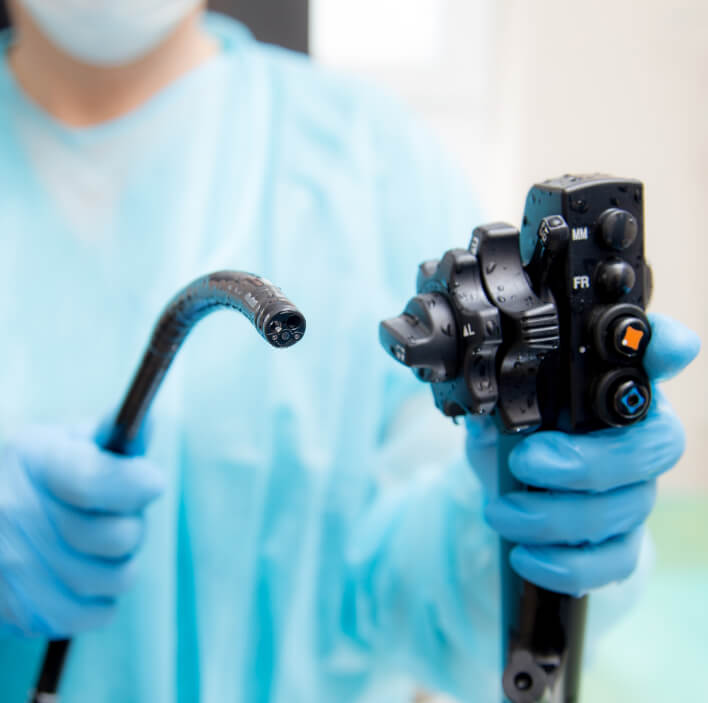ESG Surgery Treatment: Less Invasive, Highly Effective
With the Endoscopic Sleeve Gastroplasty (ESG), bariatric surgery for weight loss can now be minimally invasive and effective.
ESG reduces stomach size without the need for major surgery and allows for more sustainable weight loss and better health outcomes in the long run.
What is Endoscopic Sleeve Gastroplasty (ESG)?
Endoscopic Sleeve Gastroplasty (ESG) is a promising weight loss procedure that utilises advanced endoscopic techniques to reduce the size of the stomach without the need for traditional surgical interventions.
Unlike conventional bariatric surgeries that involve cutting and removing portions of the stomach, ESG is performed through the mouth using an endoscope—a long, flexible tube equipped with a camera and specialised instruments. During the procedure, the stomach is folded and sutured to create a sleeve-like structure that significantly decreases its capacity, allowing patients to feel full with smaller amounts of food.
This minimally invasive approach minimises pain and leads to faster recovery times, making it an increasingly popular choice among individuals seeking effective weight loss solutions.

Benefits of the ESG Procedure
One of the main advantages of ESG is its minimally invasive nature. Unlike other bariatric surgery options, such as gastric bypass or sleeve gastrectomy, ESG does not involve any external incisions. This results in a substantially lower risk of complications, including infections and long recovery periods associated with traditional surgeries.
ESG can be performed as an outpatient procedure, allowing patients to return home on the same day and resume their normal activities within a few days.
Patients who have undergone ESG also do not face the same risks of nutritional deficiencies that may occur with other bariatric surgeries, as their intestinal tract remains intact, allowing for normal absorption of nutrients.
The procedure is also reversible. If necessary, the sutures can be removed, restoring the stomach to its original size. This flexibility can provide peace of mind for those who may be apprehensive about committing to a permanent surgical option.
Achieve sustainable weight loss without major surgery.
Call us at 6737 5388 or WhatsApp us today.

Who's a Suitable Candidate for ESG Surgery?
ESG is suitable for individuals with a body mass index (BMI) of 30 or higher who have struggled with obesity and have not achieved significant weight loss through diet and exercise alone.
It is also suitable for patients who may be unable or unwilling to undergo more invasive bariatric procedures, whether due to health concerns or personal preferences.
Candidates for ESG must be committed to making lifestyle changes, including adopting healthier eating habits and engaging in regular physical activity, in order to achieve best long-term results.
ESG may not be appropriate for people with certain medical conditions, such as severe gastroesophageal reflux disease (GERD), previous gastrointestinal surgeries, or other complications that could affect the procedure's success.
Ultimately, a comprehensive evaluation by an experienced bariatric specialist will be key to determining if a patient is suitable for ESG.
What are Possible Risks of the ESG Procedure?
While the ESG is considered a safe and minimally invasive procedure, it is still a medical intervention and, like all procedures, carries potential risks.
Short-term side effects may include nausea, abdominal pain, bloating, or mild discomfort, especially in the first few days following the procedure. These symptoms are usually temporary and can be effectively managed with medications.
Though rare, more serious complications can occur, such as bleeding, infection, or unintended injury to the stomach or surrounding organs. There is also a small risk of the sutures loosening over time, which may reduce the procedure’s effectiveness and require a revision.
Choosing a qualified and experienced bariatric surgeon greatly reduces these risks. It’s also important for patients to follow all pre- and post-procedure instructions closely to support optimal recovery and long-term success.

How is the ESG Treatment Performed?
The ESG procedure is performed under general anaesthesia and usually takes about 90 minutes to two hours.
- An endoscope is gently inserted through the mouth and guided into the stomach
- Using a suturing device attached to the endoscope, the surgeon strategically creates a series of folds along the stomach’s inner lining, forming a tubular sleeve that significantly reduces the stomach’s capacity.
The entire process is guided by advanced imaging technology, which allows for precise adjustments. Because no incisions are made, patients experience less post-operative pain and scarring compared to traditional bariatric surgeries.

Effects of ESG on Weight Loss
Studies have shown that ESG usually leads to significant and sustained weight loss, with patients typically losing around 15-20% of their total body weight within the first one to two years following the procedure.
However, it must be noted that weight loss results can vary depending on individual factors such as adherence to dietary recommendations, exercise regimens, and overall lifestyle changes after the procedure.
Besides weight loss, ESG has also been associated with improvements in obesity-related conditions, such as type 2 diabetes, hypertension (high blood pressure), and sleep apnoea. Many patients report increased energy levels and improved quality of life as they achieve a healthy weight.

Recovering from the ESG Procedure
Recovery from ESG is generally quick and straightforward, with most patients returning to their daily routines within a week.
Immediately after the procedure, patients may experience mild discomfort, including nausea or abdominal tenderness, which typically resolves within a few days. A liquid diet is usually required for the first week, transitioning to soft foods before gradually incorporating regular foods over the following weeks.
Overall, ESG offers a promising alternative for those seeking effective weight loss solutions with the benefits of a minimally invasive procedure. Be sure to consult with a qualified bariatric doctor to determine if ESG is the right choice for your needs.
How Does ESG Compare to Other Weight Loss Surgeries?
Endoscopic Sleeve Gastroplasty (ESG) offers several advantages compared to traditional weight loss surgeries. Here's how it measures up:
- Invasiveness: ESG is a non-surgical, incision-free procedure performed through the mouth using an endoscope. In contrast, gastric sleeve and gastric bypass surgeries involve laparoscopic incisions and permanent anatomical changes.
- Reversibility: ESG is reversible—its sutures can be removed if necessary. Gastric sleeve and bypass surgeries are permanent procedures that cannot be undone.
- Recovery Time: Recovery from ESG is generally quicker, with many patients resuming normal activities within 3 to 5 days. Gastric sleeve and bypass may require 2 to 4 weeks of downtime due to their more invasive nature.
- Hospital Stay: ESG is often done as a day procedure, allowing same-day discharge. Traditional surgeries typically require hospital stays ranging from one to three days.
- Nutrient Absorption: ESG preserves the digestive tract's natural structure, meaning the body continues to absorb nutrients normally. Gastric bypass, however, alters nutrient absorption and often requires lifelong supplementation.
- Weight Loss Results: ESG can result in a 15–20% reduction in total body weight within 1–2 years. While gastric sleeve and bypass may produce slightly higher weight loss percentages, they also carry increased surgical risks.
- Suitability: ESG is ideal for individuals with a BMI of 30 or above who are looking for a less invasive, effective option. It’s also suited for those who may not be candidates for more complex surgeries due to medical reasons or personal preference.
Overall, ESG provides a middle ground between non-surgical methods and more invasive weight loss surgeries, offering a safe, effective, and less permanent option for those seeking long-term weight management.
We offer comprehensive, personalised care for acid reflux and obesity.
Please fill in the form to enquire or book an appointment here. We’ll get back to you as soon as possible.
Mount Elizabeth Hospital3 Mount Elizabeth #12-14 Mount ElizabethMedical Centre Singapore 228510
Tel: +65 6737 5388Whatsapp: +65 8799 2791
Opening Hours:
Mon-Fri: 9am - 5pmSat: 9am - 12.30pmClosed on Sunday & Public Holidays


